
Safe and sound
By Jerry Scott Mills
Converting Food Safety Converting packagingVaunted food safety certification keeps corrugated producer in good stead with its key customers
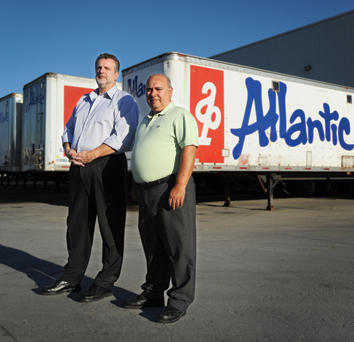
Mississauga plant manger Dan Elliot and plant superintendent Renato Bernardino stand in front of some of Atlantic’s extensive fleet of delivery trucks.
Over the past several years, the manufacturing sector in the province of Ontario—historically Canada’s industrial heartland—has undergone dramatic downsizing.
And as the province’s manufacturing base shrunk, packaging suppliers such as the Toronto-based corrugated container producer Atlantic Packaging Products Limited had to make some tough choices about which manufacturing industries offered best opportunities for future growth.
Faced with reduced demand for corrugated packaging from major industrial accounts, it made strategic sense for Atlantic to focus on securing future incremental business from Ontario’s food-and-beverage producers by growing its relationships with the current customers, while also offering a unique value proposition to new prospective clients.
To address this significant shift in demand for its products and services, in early 2009 Atlantic launched a thorough strategic review of its business to identify and understand the special needs of the local food-and-beverage industry segments and, based on its findings, devise a new strategy for expanding its business within this growing customer base.

A high-performance Martin Rapidset FFG 1228 NTRS flexographic folder-gluer from Bobst processes corrugated board at the Atlantic Packaging facility in Mississauga at speeds of up to 15,000 sheets per hour.
Ultimately, this initiative set Atlantic on a path to become the world’s first corrugated company to obtain PACsecure certification—a proprietary, third-party audited, HACCP (Hazardous Analysis Critical Control Points)-based food safety packaging standard.
“It was becoming apparent that with the manufacturing industrial sector’s demand for corrugated containers being stuck in decline, any future volume growth would have to come from consumer goods—primarily the more stable food-and-beverage and pharmaceutical segments,” recalls Peter Garvey, vice-president of sales and marketing for the company’s Corrugated Division.
Rapid Response
To respond to the changing market conditions, Garvey relates, the senior management put a “laser-like” focus on developing and executing a viable strategy that would enable all converting operations to do a better job of satisfying unresolved special needs of their food-and-beverage and pharma accounts.
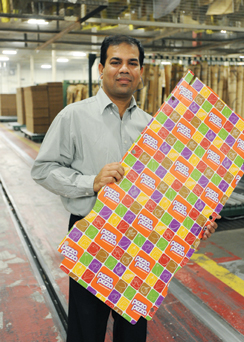
Quality control coordinator Ankur Parikh holds up a corrugated container manufactured for Pizza Pizza.
“To make it happen, we developed a corporate strategic initiative, which would be initially introduced at our corrugated packaging operation in Mississauga, Ontario.”
With several high-profile instances of food product contamination dominating the headlines around that time, it soon became apparent that food safety was quickly emerging as one of the food-and-beverage industry’s leading hot-button issues, according to Atlantic’s national sales manager Martin Fidler.
“With the business-building strategy in place, we began connecting with prospective accounts and found ourselves talking more and more about a new role for corrugated packaging in consumer health protection,” recounts Fidler.
“Any situation reported as ‘endangering the health of consumers’ could have enduring impact on the reputation of that company and its products, so we wanted to do our part by eliminating any potential sources of contamination in our corrugated container plants.”
Dan Elliot, plant manager at the Mississauga facility, says obtaining HACCP certification for the plant became a central objective for the company’s new strategic initiative.
“We believed HACCP was in our future,” says Elliot. “To build volume in a declining market we needed to be able to fulfil the most demanding needs of food-and-beverage and pharmaceutical companies, meaning we had to become more like them in terms of process security and plant hygiene.”
Attaining that superior level of recognition among food-and beverage customers would mean securing the matching AIB (American Institute of Baking) or HACCP certification—a formidable challenge given that no Atlantic corrugating plant had been HACCP-certified before, and only one Atlantic specialty plant had previously obtained AIB certification.
According to Elliot, ensuring optimal quality and purity of corrugated packaging products supplied by Atlantic meant that the company’s own production and packaging processes had to be at least as effective as those of its customers.
“In order to become their ‘supplier of choice’ we had to offer something truly better—a higher level of disciplined quality assurance throughout our company’s entire production process,” he says. “Initially it was AIB, but our ultimate goal was HACCP.”
According to Fidler, the Mississauga plant employees quickly got on-board—bolstered by the significant upfront investment and implementation of new process disciplines needed to make it happen, as well as full support of top management and ownership.
“Our senior management really ‘stepped up to the plate’ and approved the proposed critical path with a budget that represented a significant investment in our future, and this occurred during a period of relatively tough financial times for this industry and our customers,” Fidler points out.
“Everyone at every level shared a vision of industry leadership that would be exemplified by the Mississauga plant’s unique achievements during the coming year.”
To get the ball rolling, the plant’s quality control coordinator Ankur Parikh put together a proposed plan and budget based on what needed to be done at the facility—including a number of required equipment changes identified by Elliot as ‘likely needed’ to earn HACCP certification.
In addition, all equipment and tools at the plant had to be standardized and single-sourced.
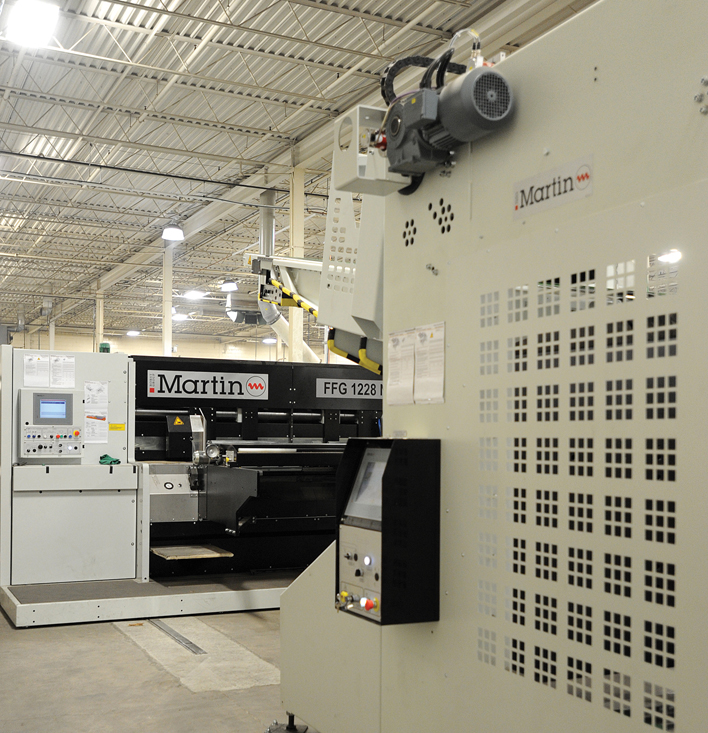
SEW-Eurodrive motors are used to power some of the key sections of the Bobst Martin equipment at the plant.
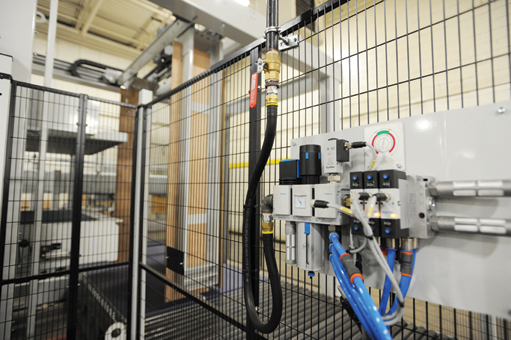
Festo’s pneumatic components are used extensively to operate a palletizing station at the Mississauga facility.
Whereas machine operators formerly used their own tools at the workstations, there were now no personal tools whatsoever being permitted on the plant floor. With standardized sets of new tools supplied for every machine, Parikh relates, machine operators would be able to perform machine set-up quicker and more accurately.
But equipment and tooling aside, what really needed to take place was a sweeping cultural change, according to Parikh, driven by heightened awareness of the need for hazard avoidance through greater personal care and responsibility.
Work To Rule
This meant banning personal items like cellphones from the plant floor, not allowing coats and jackets to be carried to and from workstations, and keeping the entire plant clean and clutter-free at all times.
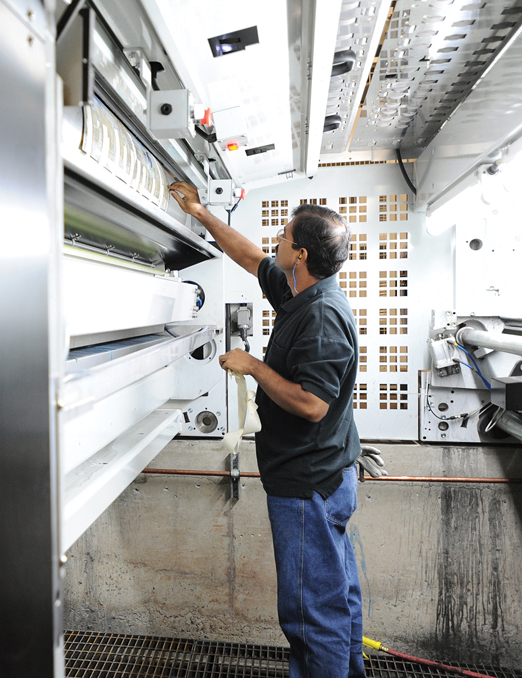
A machine operator standing in a pit below the Rapidset FFG machine inspecting the quality of a printing plate.
It was not an entirely easy sell, as Parikh recalls.
“The new HACCP procedures came as a bit of a surprise at first, especially to many longer-term employees who experienced a big change from what they had been accustomed during their years and decades of working at the Mississauga plant,” he relates. “When the stringent new rules were introduced, some plant personnel were upset.
“But they soon came to appreciate the need to create a completely hygienic production environment when it was explained that just one little peanut could make life miserable for someone with a serious peanut allergy who might come into contact with a contaminated corrugated packaging item used for our customer’s products.
“Wherever a food product claim like ‘Peanut Free’ appears on the primary package, its secondary container from Atlantic must support that promise,” Parikh asserts. “We simply cannot inadvertently put our customers, and their customers, at risk.”
But as employees began to appreciate they were making a product that enters the food production chain, he recounts, their attention to quality and detail evolved accordingly, while their production records became more thorough, disciplined, and better organized for data recovery.
“It takes a lot of applied diligence to make the system work perfectly and earn total trust from our customers,” says Parikh, “but the end result is certainly worth the effort.”
After obtaining the AIB certification in July of 2009, Parikh recalls, the plant immediately started getting ready for an upcoming HACCP audit by leading third-party quality management systems registrar QMI Global.
“We were audited on November 24 of 2009, and our first-ever submission was approved, subject to minor corrective actions which were implemented immediately,” Parikh says. “On December 14, we attained the PACsecure registration, which we think was a real world-class achievement.”
The company’s major customers agree wholeheartedly.

A close-up of a Valco Cincinnati gluer control panel installed on the Rapidset FFG 1228 NTRS to ensure optimal glue pattern formation and application.
“We are pleased to see Atlantic being progressive—they’ve done some really nice work upstream in improving their levels of service, quality and food safety,” says Steven James, head of procurement for PepsiCo Foods Canada.
“The HACCP credentials earned by Atlantic has given us added assurance that their packaging can deliver wholesomeness and food safety into our manufacturing environments,” James adds.
“It’s something we definitely take into account as part of our sourcing, and it is reassuring to have a partner we can count on for trusted support.”
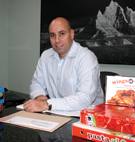
Marcelo Melo, director of quality assurance and product development for Pizza Pizza and Pizza 73, surrounded by corrugated cartons manufactured by Atlantic Packaging.
Adds Marcelo Melo, director of quality assurance for the Pizza Pizza chain: “We take food safety seriously: Pizza Pizza has long required that our food ingredient suppliers be HACCP-certified, and Atlantic’s ability to meet HACCP requirements at their Mississauga plant has certainly positioned them at the forefront of our packaging suppliers.
“As part of our own quality assurance system, we periodically inspect our suppliers’ operations,” Melo expands, “but having the HACCP disciplines in place at Atlantic has given us the confidence to decrease the frequency of those on-site inspections.
“It’s a time- and cost-saving change that benefits both of our companies.”
Jerry Scott Mills is a freelance writer based in Oakville, Ont.
Photos by Cole Garside
Advertisement

